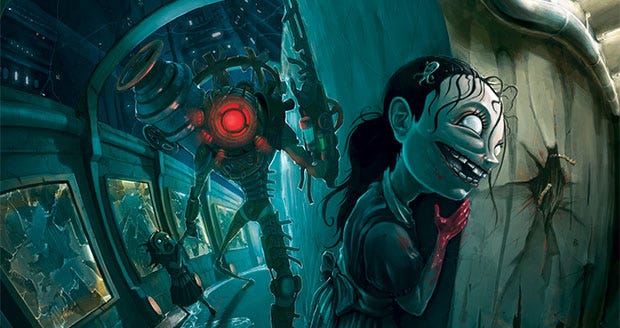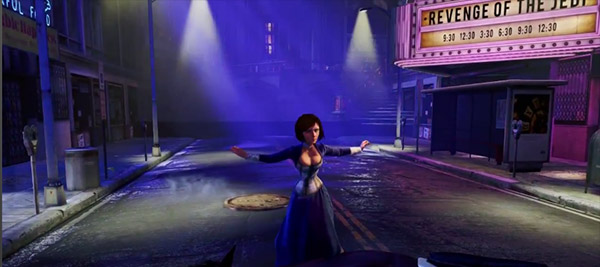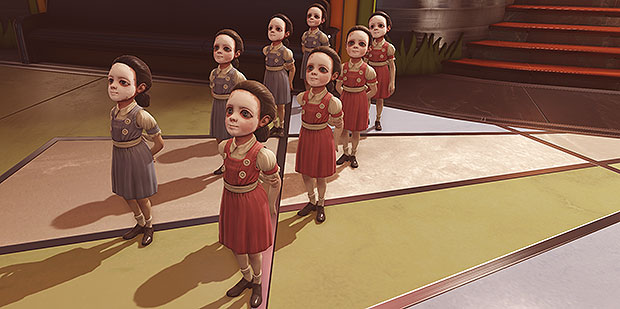What I Want From The Next BioShock
Break the chain
Ken Levine has moved onto other projects, and Irrational essentially no longer exists, but publishers 2K have declared that the BioShock series will continue nonetheless. Good, I'm glad: the games so far have had downs as well as ups to say the least, but they have, to a one, attempted to do things that other big-budget shooters do not. It'd be a terrible shame if that was lost and the floor ceded to yet more military-inspired prepostero-realism. I'm also fascinated to see what a BioShock game that wasn't led by someone who has, for better or worse, become something of a figurehead for game stories and high concepts would look like. Would they become more free to explore their own worlds, less hampered by the need to meet expectations of Big Ideas and Ultimate Answers?
There are things I'd like the next game to try. There are things I desperately pray it doesn't do. These are just a few of each. Would you kindly take a look? (Contains some spoilers for BioShock 1 & Infinite).
Have a brand new setting, entirely disconnected from the other games
Two reasons for this - one is that Rapture (post-fall, at least) is over-familiar by now, and it would be sad to see the Big Daddies and Little Sisters lose whatever impact and pathos they have left, while Columbia didn't quite click in the same way and a second attempt may not change that.
The other is that BioShock Infinite and its DLC went to great - possibly excessive - lengths to close the circle. Sure, you could spin new stories and characters off from it, but they'd always be in the shadow of the meta-narrative established by Infinite's ending. It would not be edifying to play through tales that you already know don't really matter, that are a sideshow to greater events, just one more lighthouse is an endless sea of them. Infinite's conclusion was to say that all possible BioShocks, past, present and future, were part of Levine's one central tale and universe. That all of this has happened before and will do again - and, in turn, perhaps that nothing really matters. Escaping that infinite loop - breaking the great chain - is necessary for a new game to have its own meaning.
Lose the period setting, but keep the cultural overtones
With Fallout also regularly milking the same vintage style meets fantastical technology teat, the formula is in danger of feeling stale. I don't need to hear the Inkspots while shooting mutants again (although I wouldn't want to lose the music/strange place dynamic). But there's more to it than that: both BioShocks (for the sake of ease I'm treating 2 as an extension of 1 unless otherwise specified) tried to say something about philosophy and politics, but sheltered in history as they did so, rather than being pointed about the problems of latter-day society.
These are peculiarly intelligent games, at least by the standards of their big-budget peers, laced with (albeit sometimes muddled) commentary on the human condition: it may well be that they can be more powerful if they're overtly talking about that condition today. The current racial tensions in America, rather than those of two centuries ago. The ongoing ideological war between left and right. The celebritization of leaders. How wars are fought now, how the 'enemy' is depicted. Privacy, worker exploitation, consumerism. Of course, this involves a terrible risk of becoming too worthy for its own good - there's a fine line. But all meaning can be squandered when the formula endlessly remains 'anachronism is fun!' Our world is a twisted one too: there's no need to look exclusively to the past.
And hell, wouldn't you play a BioShock where the speakers played Taylor Swift instead of Bobby Darin?
Embrace non-combat
For a series which has consistently preached that empathy is a more vital force than violence, BioShock sure is reluctant to let its players interact with anything other than a weapon. Yet, in all the games so far, the most memorable sections are those in which you're not directly fighting something or someone - you're exploring, switching between admiration and discomfort at what you see, filling in detail on the world. But, God help me, if only you could talk to the monsters. Because most of the time, they're not monsters: they're people whose tales you've read and heard extracts of, people who have lost things, people who had plans for greatness.
The first BioShock draws an inviolable line between those who were mutated into killers and those few who kept their faculties, then ensures you're kept at arm's length from the latter. Infinite does include any number of 'innocent' characters but artificially clears the stage whenever it decrees combat is happening, lending an animatronic theme park atmosphere to proceedings.
I'm not suggesting that BioShock should become a conversations and quests game - though I would be interested to see that - but simply that it offers a choice of approach. The Burial At Sea Part Two DLC massively amplified the hitherto underused stealth systems, and offered an ongoing option to avoid combat rather than murder everyone, and at the very least I'd like to see more done with that. If you are feeling conflicted about the place you're in and the people who reside in it, perhaps there could be the option of non-lethality, and even of total avoidance. If a situation turns to open violence, it would be because you've chosen for that to be the case - or perhaps bungled something - and there will likely be consequences to how you are perceived as a result.
BioShock 1 drew some fire because of the Manichean nature of its major choice - whether you consumed or saved Little Sisters - but as it happens I agree with the assertion that if you kill even just one little girl in order to make your own life easier then yes, you are a monster. The trouble is that it's a hard choice parachuted in at prescribed moments, with a prescribed outcome, rather than one which reflects your general behaviour.
BioShock and Infinite both mandate that the only possible response is shoot first, have questions answered for you after, and then plot reveals arguably rob you of hero status. More options for stealth, non-lethality or even negotiation (perhaps a faction system) throughout would open it up and allow more plausible reflections upon your own morality, as well as more varied power and weapon upgrades, without going all the way into making it Mass Effect. A chance to explore the environments and the people in them, before deciding whether or not to blow them away.
More experimental weapons and powers
One of the joys of the first game, at least at first, was experimenting with Plasmid and weapon combinations, setting traps and chaining attacks. This wasn't lost in subsequent games, but it wasn't meaningfully furthered. It was too effective to simply shoot, and to lob the most destructive magic powers, and so in turn it was too tempting to do nothing but that. There's bound to be a way to make those combo attacks more rewarding, more consistently available and more surprising, and less about occasionally stumbling across a puddle with three guys stood in it so you can conveniently electrocute it.
Lose the mysticism
BioShock wouldn't be BioShock without science-fantasy, but the games are at their weakest when they ask for even more suspension of disbelief. The sea slugs and their magic mutant chemical, Elizabeth's dimension-tearing powers, the concept of multiple realities to tie everything together, and of course the first game's notorious Big Blue Man boss fight: all of these undermine the essential concept of a breakaway society fallen into darkness because its politics were too extreme or naive. We have to believe all this wild stuff, and that in turn means there are no rules: anything can be made to happen and hand-waved away if the writer desires it, which Infinite was particularly guilty of come its denouement. I was left feeling as though nothing was real, because the game was so free to pluck answers to any conundrum from the ether.
Even the Plasmid and Tonic powers, supposedly gained from genetic modification and experimental chemicals, struggle for plausibility, as well as failing to retain any sense that the player character was doing horrible things to himself. They are things which could be more convincingly replicated with mere weaponary, or some more visible, permanent modification of the player's body.
Most of all, though, I'd like there to be a line in the sand between theoretical science and science-magic. The knowledge that a butchered, brainwashed man is inside a Big Daddy's expressionless suit is harrowing; a nasty fellow who dresses as a bird and drinks a potion which can make him teleport and summon crows is not. Which in turn brings me to...
Don't lose the horror
BioShock initially used its System Shock 2 roots, and what its own title suggests - creating a forlorn and sinister world of uncertainty and menace. As it wore on it became more about straight-up action, while BioShock: Infinite of course opted for all-out colour throughout. I admire Infinite for that, for trying to steer clear of the series' own tropes, but at the same it hamstrung itself. We were supposed to believe there was a happy, bright society but which had monsters and murderers lurking in every corner. The switching between light and dark, often mere metres and moments apart, often made it feel unreal.
Some have argued this was deliberate, that Infinite really was trying to be a theme park, but even if that is the case I'm not sure the results were entirely effective. Some of the light sections - particularly the long stretch centred around the leisure beach - were hugely memorable, and it would be a shame if the series abandoned such attempts at life, but what we didn't see was a real sense that this might be lost. If there are to be monsters, make them monstrous, not unexciting armed men who arrive from nowhere, the stage neatly cleared for them. I want fear back. The fear of what's around the corner. The fear of what motivates this place. The fear of who's watching me. The fear that I might be making a bad situation worse.
Go smaller, not bigger
BioShock 2 is, with hindsight, the most conceptually successful of the series, and I think that can be at least partially ascribed to its narrowed focus. It picked a smaller tale that existed purely within Rapture, was entirely resolved by the conclusion and in the main did not require huge leaps of faith or after-the-fact theorising. DLC Minerva's Den went even further, a vignette almost untouched by the wider events and wilder ideas.
That's the direction I'd like the next BioShock to take: a new place, and a tale which never seeks to go beyond that place. Lore is for the most fervent fans, but events are for everyone. Make the place real, make its stories rock-solid, don't aspire to be everything, don't strive for cosmic significance. There is power enough in places.
















